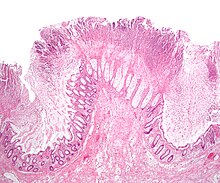 New therapies are needed to manage the increasing incidence, severity, and high rate of recurrence of Clostridium difficile infection.
New therapies are needed to manage the increasing incidence, severity, and high rate of recurrence of Clostridium difficile infection.A randomized, double-blind, placebo-controlled study included 2 neutralizing, fully human monoclonal antibodies against C. difficile toxins A (CDA1) and B (CDB1). The antibodies were administered together as a single infusion, each at a dose of 10 mg per kilogram of body weight, in patients with symptomatic C. difficile infection who were receiving either metronidazole or vancomycin.
Among the 200 patients who were enrolled (101 in the antibody group and 99 in the placebo group), the rate of recurrence of C. difficile infection was lower among patients treated with monoclonal antibodies (7% vs. 25%).
However, the mean duration of the initial hospitalization for inpatients did not differ significantly between the antibody and placebo groups (9.5 and 9.4 days, respectively).
The addition of monoclonal antibodies against C. difficile toxins to antibiotic agents significantly reduced the recurrence of C. difficile infection.
My opinion: It is always encouraging to add new tools to the treatment armamentarium aimed at defeating dangerous infections such as C. diff. colitis. However, monoclonal antibodies are generally very expensive and require intravenous administration.
References:
Treatment with Monoclonal Antibodies against Clostridium difficile Toxins. Israel Lowy. NEJM Volume 362:197-205 January 21, 2010 Number 3.
No antibitoc is superior for initial cure of C. difficile infection. Recurrence is less frequent with fidaxomicin http://goo.gl/dBRDj
Image source: Micrograph of a colonic pseudomembrane in Clostridium difficile colitis, a type of pseudomembranous colitis. H&E stain. Wikipedia, Nephron, Creative Commons Attribution-Share Alike 3.0 Unported license.